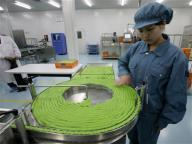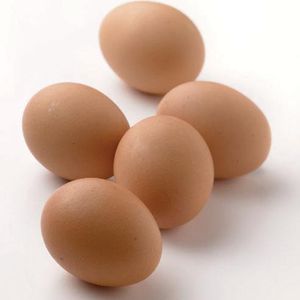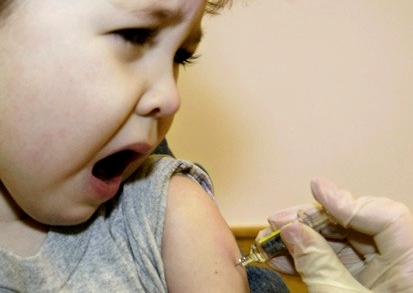
Studies show one dose of H1N1 vaccine may be enough
Two studies published on Thursday confirmed that a single dose of swine flu vaccine can protect people from the new pandemic H1N1 virus — welcome news to global health officials who had worried that people might need two doses.
Australian vaccine maker CSL Inc. released new data showing its vaccine got what would be considered a protective immune response with a singe dose, and Swiss drug maker Novartis presented a study confirming a report from last week showing its vaccine worked at an even lower dose when boosted with an immune system compound called an adjuvant.
Both studies, published in the New England Journal of Medicine, may lay to rest fears about the logistical nightmare of trying to vaccinate hundreds of millions of people globally with two doses of H1N1 vaccine — given a month apart — in addition to a single recommended dose of seasonal influenza vaccine.
Last week China’s Sinovac also reported its vaccine protected patients with a single dose.
The new H1N1 strain of flu, declared a pandemic in June, could eventually infect one third of the world’s population, or 2 billion people, according to the World Health Organization.
Because it is a new strain, infectious disease experts had said people would likely need two doses to get full immunity against the virus. They are rushing to put in place vaccine programs as the weather cools in the Northern Hemisphere and the traditional flu season starts.
About 20 pharmaceutical companies including Sanofi-Aventis, GlaxoSmithKline and AstraZeneca’s MedImmune unit are also racing to develop H1N1 vaccine as governments scramble to secure supplies.
The United States hopes to vaccinate 160 million Americans by the beginning of December.
NASAL SPRAY READY
Also on Thursday, MedImmune said its inhaled vaccine against the pandemic H1N1 virus could be ready to start shipping to the U.S. government by the end of September.
MedImmune’s Dr. Raburn Mallory said the company has submitted safety data for its nasal spray swine flu vaccine to the U.S. Food and Drug Administration.
“There are no red flags there. We think we can have 5 million doses ready to distribute at the end of September,” Mallory said in an interview. U.S. officials had not expected vaccination to begin until mid-October.
The company has 5 million doses in spray devices now, a company spokeswoman said, adding that a more conservative estimate would be that 3.5 million doses could be sent out by the end of September.
U.S. health officials said they started testing swine flu vaccines in pregnant women this week and were scheduled on Friday to report on results of some of the tests being done on various swine flu vaccines for the U.S. market.
The U.S. Food and Drug Administration is licensing H1N1 vaccines as if they are a simple reformulation of the seasonal flu vaccine. This does not require clinical tests, but the National Institutes of Health is running clinical tests anyway, to be sure it is safe and to find the best dose.
Governments in Europe have started to take delivery of H1N1 swine flu vaccines but are awaiting a license from European authorities before they can start mass vaccinations.
“The immune response to all these vaccines is a very high response, whatever type of vaccine it is, whether it is adjuvanted or non-adjuvanted,” Thomas Lonngren, executive director of the European Medicines Agency or EMEA, told a news briefing.
Studies show , Studies show Health, Studies show Health Latest, Studies show Health Information, Studies show Health information, Studies show Health Photo,Exercising for Weight Health photo, Studies show Health Latest, Studies show Health latest, Exercising for Weight Health Story, Healthy Minnesota Health story, Studies show Video, Studies show video, Studies show Health History, Studies show Health history, Studies show over Picture, history, Studies show Asia, Healthy Minnesota asia, Studies show Gallery, Exercising for Weight gallery, Studies show Photo Gallery, Healthy Minnesota photo gallery, Studies show Picture, Studies show picture, Studies show Web, Malaysia Health, web Health, web Health picture, video photo, video surgery, gallery, laparoscopy, virus, flu, drug, video, Health Health, calories, photo, nutrition, health video, symptoms, cancer, medical, beating, diet, physical, Training, organic, gym, blister, exercise, weightloss, surgery, spiritual, eating, tips, skin, operation, bf1, Studies, show, one, dose, of, H1N1, vaccine, may, be, enough




